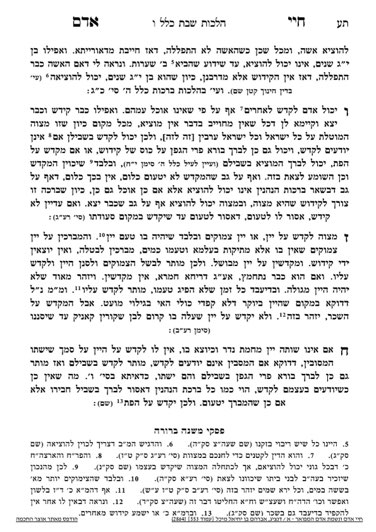The current series, which will cover Maariv on Friday night and Kiddush, is available for sponsorship. Please contact Rabbi Reingold for more information.
We are beginning siman 7. The Chayei Adam writes that Chazal enacted that the mitzvah of kiddush should be fulfilled through wine. Next, he writes that raisin wine is considered wine. Although it is also a grape, because they are dried, they do not always impart sufficient flavor into the wine. Historically, in Northern Europe, it was not possible to grow grapes and it was not feasible to import. Therefore, most people used raisin wine. Practically, nowadays most people do not ever use raisin wine.
The Chayei Adam writes that one can make kiddush on yayin mevushal. Yayin mevushal is a machlokes brought down in Shulchan Aruch. The Rambam holds that one cannot use yayin mevushal for kiddush, because yayin mevushal (or wine with any other additives) could not be brought on the Mizbeach. The Rambam holds that the wine used for kiddush must meet the same criteria as the wine used on the Mizbeach. However, the Rema writes that the minhag is not in accordance with the Rambam, and yayin mevushal is muttar for kiddush. If one wishes to be machmir and follow the opinion of the Rambam, they would have to procure a wine which does not have any additives or preservatives, in addition to not being mevushal.
The Chayei Adam returns to the raisins, and points out that given that we are not makpid that the wine used is not mevushal, one can cook the raisins they wish to use to make raisin wine, in order to help them impart more flavor.
The Chayei Adam writes that some hold the wine used for kiddush should not have any issues with gilui. There are two issues with gilui. The Gemara says that in places where snakes were common, there was a type of snake which was known to drink from liquids and leave a venom in the liquid. Therefore, Chazal enacted an issur to drink liquids left open, out of concern that they have venom in them. The Shulchan Aruch and Rema hold that in places where snakes are not common, there is no concern for gilui. Therefore, since in most of the places we currently live there is no concern for snakes, there is no concern for this type of gilui.
There is a second issue with gilui. Even when there is no concern for the danger of snake venom, wine which is left open tends to lose its flavor, and/or various items and particles fall into it. It is not something which a person would present to an important guest, such as the governors in Europe who had tremendous power. If one would not offer the wine to their governor, it is inappropriate to offer it to Hashem either.
Therefore, the Chayei Adam writes that it is appropriate to keep the wine corked as much as possible to avoid either of these issues of gilui. Bedieved, the Chayei Adam writes that if one did leave their wine open, if they taste it and discern that it has not lost its flavor, bedieved it is muttar. Additionally, the Chayei Adam clarifies that he is discussing a place where wine is expensive, so it was acceptable to people to overlook the fact it was open. If one lives in a place where wine is readily available at a cheap price, one should be makpid never to use wine which was left open. Similarly, if one is making kiddush on beer, since it is also readily available at an affordable price, one should replace the beer before making kiddush.
Summary
The mitzvah of kiddush was enacted by Chazal to be recited over wine.
We pasken that yayin mevushal is muttar for kiddush, although the Rambam holds that it cannot be mevushal and cannot have any additives (including sugar).
Similarly, wine which has had additives added is kasher, not like the Rambam.
It is appropriate to be makpid for gilui; that is, wine which was left out to the point that the flavor may have changed or particles may have fallen in. If wine is expensive, if one can taste the wine and discern that the flavor has not changed, bedieved it is muttar.
If wine is not expensive, one should never use wine left open for kiddush; even so, bedieved one is yotzei with it.



